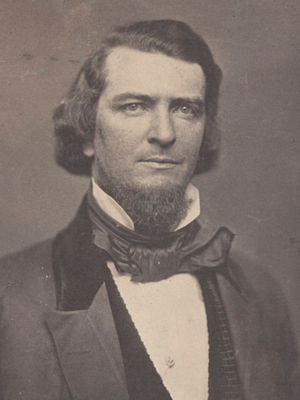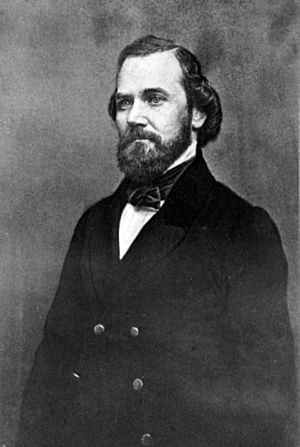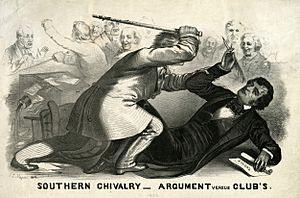Preston Brooks facts for kids
Quick facts for kids
Preston Brooks
|
|
|---|---|
 |
|
| Member of the U.S. House of Representatives from South Carolina's 4th district |
|
| In office August 1, 1856 – January 27, 1857 |
|
| Preceded by | Himself |
| Succeeded by | Milledge Bonham |
| In office March 4, 1853 – July 15, 1856 |
|
| Preceded by | John McQueen |
| Succeeded by | Himself |
| Member of the South Carolina House of Representatives from the Edgefield County district |
|
| In office November 25, 1844 – December 15, 1845 |
|
| Personal details | |
| Born |
Preston Smith Brooks
August 5, 1819 Edgefield County, South Carolina, U.S. |
| Died | January 27, 1857 (aged 37) Washington D.C., U.S. |
| Political party | Democratic |
| Education | University of South Carolina |
| Military service | |
| Allegiance | |
| Branch/service | |
| Years of service | 1846–1848 |
| Rank | Colonel |
| Commands | Palmetto Regiment |
| Battles/wars | Mexican-American War • Battle of Chapultepec |
Preston Smith Brooks (born August 5, 1819 – died January 27, 1857) was an American politician. He served in the U.S. House of Representatives for South Carolina. He was a representative from 1853 until his resignation in July 1856. He then served again from August 1856 until his death.
Brooks was a member of the Democratic Party. He strongly supported slavery and the idea of states' rights. This meant states should have more power than the federal government. He is best known for an event on May 22, 1856. He attacked Senator Charles Sumner on the floor of the United States Senate. Sumner was an abolitionist, meaning he wanted to end slavery. Brooks beat Sumner with a cane. This was because Sumner had given a speech that criticized Brooks's cousin, Senator Andrew Butler.
Sumner was badly hurt by the attack. He could not return to the Senate for three years. However, he did recover and continued his work as a senator. The state of Massachusetts reelected Sumner in 1856. They left his seat empty to remind everyone of the violence.
An effort to remove Brooks from the House of Representatives did not succeed. He received only a small punishment in his court case. He resigned his seat in July 1856. This allowed people in his area to show if they supported his actions. They reelected him in a special election in August. He was elected for a full term in November 1856. But he died in January 1857, before his new term began.
Historian Stephen Puleo said that this attack had a huge impact. It pushed the country closer to the Civil War.
Contents
Early Life and Education
Preston Brooks was born in Edgefield County, South Carolina. This was on August 5, 1819. His parents were Whitfield Brooks and Mary Parsons Carroll Brooks. He went to South Carolina College, which is now the University of South Carolina. But he was expelled before he could graduate. This happened because he threatened police officers with guns. After college, he studied law. He became a lawyer and practiced law in Edgefield.
Brooks also owned a large farm called a plantation. It was located between Edgefield and Ninety-Six. In 1840, Brooks fought a duel with Louis T. Wigfall. Wigfall later became a senator for Texas. Brooks was shot in the hip during this duel. This injury made him need a walking cane for the rest of his life. He became a lawyer in 1845. Brooks also served as a Captain in the Mexican–American War. He was part of Company D of the Palmetto Regiment.
Family Life
Preston Brooks' first wife was Caroline Harper Means. She lived from 1820 to 1843. They had one child, Whitfield D. Brooks. This child was born and died in 1843. Preston Brooks became a widower when Caroline passed away.
Brooks' second wife was Martha Caroline Means. She lived from 1826 to 1901. She was his first wife's sister. They had three children together. Their names were Caroline Harper Brooks, Rosa Brooks, and Preston Smith Brooks. Martha lived longer than her husband.
Political Career and Beliefs
Brooks was a member of the South Carolina state House of Representatives in 1844. In 1853, he was elected to the 33rd United States Congress. He was a Democrat. Like other politicians from South Carolina, Brooks strongly supported slavery. He believed that owning enslaved Black people was right. He also thought that any effort to limit slavery was an attack on the South's way of life.
During his time in Congress, there was a big debate about slavery in Kansas. People argued if Kansas should join the United States as a free state or a slave state. Brooks supported actions by pro-slavery people from Missouri. They wanted Kansas to become a slave territory. This time was known as Bleeding Kansas. In March 1856, Brooks wrote about his concerns. He believed that if Kansas became a free state, the value of enslaved people in Missouri would drop. He also thought that the movement to end slavery would become stronger.
The Attack on Charles Sumner
On May 20, 1856, Senator Charles Sumner gave a speech. He called it "The Crime Against Kansas." In his speech, he criticized Southern leaders. He included Brooks's cousin, Senator Andrew Butler. Sumner used very strong and harsh words on purpose.
Brooks thought about challenging Sumner to a duel. He talked to Representative Laurence M. Keitt about dueling rules. Keitt said that dueling was for gentlemen of equal social standing. He believed Sumner was not a gentleman because of his insulting words. So, Brooks decided to "punish" Sumner with a public beating instead.
As a result of the attack, Sumner suffered head injuries. These injuries caused him pain for a long time. He spent three years recovering before he could return to his Senate seat. He continued to have pain and health problems for the rest of his life.
After the Attack
People across the country reacted very differently to Brooks's attack. In Congress, some members started carrying weapons. Brooks never said he was sorry for the attack. When he resigned from the House on June 14, 1856, he said he had acted honorably. He also spoke against any attempts to punish him.
Many people in the South cheered Brooks. They saw his attack on Sumner as a fair and right action. People in South Carolina sent Brooks many new canes. One cane had the words "Good job" on it. A newspaper called the Richmond Enquirer wrote that the act was good. The Jefferson Literary and Debating Society at the University of Virginia sent Brooks a new cane with a gold handle. Southern lawmakers even made rings from pieces of Brooks's broken cane. They wore these rings on chains around their necks to show their support.
However, people in the North were shocked by Brooks's violence. Even those who disagreed with Sumner's strong anti-slavery words were upset. Anti-slavery supporters said this showed that the South no longer wanted to debate. They believed the South now used violence to silence opponents. A famous cartoon by J. L. Magee showed this feeling. It suggested that the South's idea of honor had turned into violence.
Congressman Anson Burlingame from the American Party challenged Brooks. Burlingame made some remarks that made Brooks challenge him to a duel. Burlingame accepted the challenge. He chose rifles as the weapons. He picked Niagara Falls, Canada, as the location. This was to get around the U.S. ban on dueling. Brooks was known to be a good shot. But he backed out of the duel. He said it would be too risky to travel through "hostile country" (the Northern states) to reach Canada.
Brooks said he did not mean to disrespect the Senate. He also claimed he did not intend to kill Sumner. He said if he had, he would have used a different weapon. Brooks was tried in a court in Washington D.C. for the attack. He was found guilty of assault. He had to pay a fine of $300, but he was not put in jail.
A vote to remove Brooks from the House failed. But he resigned on July 15. This gave the people he represented a chance to show if they approved of his actions. They showed their support by reelecting him in a special election on August 1. Then, they elected him for a new term in November 1856.
Death
Preston Brooks died suddenly from a severe illness called croup. This happened on January 27, 1857. It was just a few weeks before his new term in Congress was supposed to start. He was buried in Edgefield, South Carolina. The official message about his death said he suffered greatly. It mentioned he tried to tear his own throat to breathe. Even with bad weather, thousands of people went to the Capitol for his memorial services. After his body was taken back to Edgefield, a large crowd attended his funeral.
Legacy
Several places are named after Preston Brooks. These include the city of Brooksville, Florida. This city was formed by combining the towns of Melendez and Pierceville. Brooks County, Georgia is also named after him. The area now known as Big Bend, West Virginia was once called Brooksville, Virginia. All these places were named shortly after his attack on Sumner.
See also
- List of federal political scandals in the United States
- List of United States Congress members who died in office (1790–1899)
 | Leon Lynch |
 | Milton P. Webster |
 | Ferdinand Smith |



